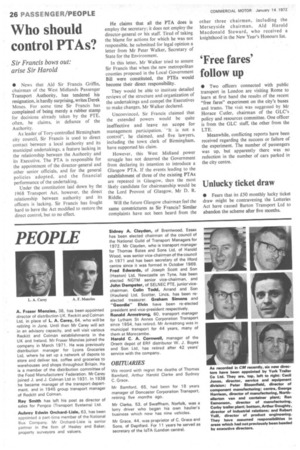Who should control PTAs?
Page 28

If you've noticed an error in this article please click here to report it so we can fix it.
Sir Francis bows out: arise Sir Harold
• News that Aid Sir Francis Griffin, chairman of the West Midlands Passenger Transport Authority, has tendered his resignation, is hardly surprising, writes Derek Moses. For some time Sir Francis has complained of being merely a rubber stamp for decisions already taken by the PTE, often, he claims, in defiance of the Authority.
As leader of Tory-controlled Birmingham city council. Sir Francis is used to direct contact between a local authority and its municipal undertakings, a feature lacking in the relationship between the Authority and its Executive. The PTA is responsible for the appointment of the director-general and other senior officials, and for the general policies adopted, and the financial performance of the undertaking.
Under the constitution laid down by the 1968 Transport Act, however, the direct relationship between authority and its officers is lacking. Sir Francis has fought hard to have the Act modified to restore the direct control, but to no effect. He claims that all the PTA does is employ the secretary; it does not employ the director-general or his staff. Tired of taking the blame for actions for which he was not responsible. he submitted for legal opinion a letter from Mr Peter Walker, Secretary of State for the Environment.
In this letter, Mr. Walker tried to assure Sir Francis that when the new metropolitan counties proposed in the Local Government Bill were constituted, the PTEs would become their direct responsibility.
They would be able to institute detailed reviews of the structure and organization of the undertakings and compel the Executives to make changes, Mr Walker declared.
Unconvinced, Sir Francis claimed that the extended powers would be quite ineffective and leave no scope for management participation. "It is not a control", he claimed, and five lawyers, including the town clerk of Birmingham, have supported his claim.
However, this West Midland power struggle has not deterred the Government from declaring its intention to introduce a Glasgow PTA. If the events leading to the establishment of three of the existing PTAs are repeated in Glasgow, then the most likely candidate for chairmanship would be the Lord Provost of Glasgow, Mr D. R. Riddle.
Will the future Glasgow chairman feel the same constrictures as Sir Francis? Similar complaints have not been heard from the other three chairmen, including the Merseyside chairman, Ald Harold Macdonald Steward, who received a knighthood in the New Year's Honours list.
















































































































